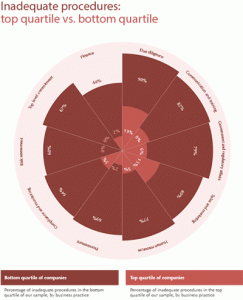Anti-corruption white paper published by GoodCorporation
Three years after the UK Bribery Act came into force, businesses are still struggling to implement the procedures necessary to prevent corruption, with over a third of almost 3,000 anti-corruption controls assessed by GoodCorporation graded inadequate.
This is one the findings, published ahead of the United Nation’s International Anti-Corruption Day (9/12/14), in a white paper by GoodCorporation, leading practitioners in assessing and advising business on responsible management practices. Combating corruption: are businesses doing enough? reveals that a number of the anti-bribery procedures recommended by the Ministry of Justice are not being successfully implemented.
Sixty three per cent of the anti-corruption due diligence procedures assessed by GoodCorporation were found to be inadequate. Businesses are more at risk from corruption by third parties than in any other area of their business. Such a high level of inadequate procedures in the control of third parties will make businesses extremely vulnerable if facing prosecution for bribery.
Said GoodCorporation director Leo Martin, “It is clear from our evaluation that many businesses are failing to implement adequate procedures to prevent bribery. As a result we predict that a wave of new corruption scandals is almost inevitable.”
The penalty for failure is high. Multi-million pound fines, such as the £297 million recently levied against GSK by the Chinese, are increasingly common and we are likely to see even more according to GoodCorporation’s Leo Martin. “The Ministry of Justice has made it very clear what they expect businesses to put in place to prevent corruption. That so many of the recommended procedures are not being properly implemented should be a real concern for businesses. It weakens any corporate defence while aiding prosecutors to bring about a successful case.”
Even more worrying for businesses however is the fact that a clear gap is emerging between those companies that are succeeding in putting adequate procedures in place and those that are not. GoodCorporation has divided the companies assessed into four quartiles, according to average grades. The disparity between the top and bottom quartiles is striking, with good companies outperforming weaker companies significantly. In the area of anti-corruption due-diligence this is particularly marked with 90 per cent of companies in the bottom quartile having inadequate procedures, versus just 19 per cent in the top quartile.
Given that demonstrating robust adequate procedures is a company’s only defence should it face a corruption charge, this is a real cause for concern.
Leo Martin added; “The fact that some businesses are starting to get this right shows what can be achieved and that ‘adequate procedures’ is not an unattainable goal. While this is good news in the battle to prevent corruption, this also makes businesses that are struggling to put the right measures in place even more vulnerable.”
Further key findings from the white paper
- Companies in the top quartile are outperforming those in the bottom considerably with the biggest gap in the area of anti-corruption communication and training. Eighty two per cent of the controls were inadequate in the bottom quartile versus only 8 per cent inadequate in the top.
- All companies in the top quartile could demonstrate a strong top-level commitment to implementing ABC controls with a clear ABC policy that is widely and publicly communicated and a zero-tolerance statement from the board.
- Anti-corruption due diligence is the hardest area to get right (63 per cent inadequate) followed by communication and training (50% inadequate) government and regulatory affairs (45 per cent inadequate) and human resources (42 per cent inadequate).
- Functions used to regulation and policy compliance such as Finance and Procurement faired best with a low number of inadequate controls (19% and 35% respectively). However government and regulatory affairs departments are struggling to come to terms with implementing effective controls (45% inadequate) demonstrating that dealing with governments is still a very grey area that needs focus.
- Training of sales intermediaries is a particularly week area with 63 per cent of the procedures checked found to be inadequate. Given that this is an area particularly prone to malpractice, this should be a cause for concern and an area for renewed focus.
Commenting in the foreword, Robert Barrington, executive director of Transparency International UK said; “The message from this GoodCorporation report is that an encouraging number of companies have made a good start. This is in line with Transparency International’s own research on UK companies (). But is also true that for most companies there is more to be done.”
ENDS
Note to editors: Leo Martin director of GoodCorporation is available for interview.
Combating Corruption: are businesses doing enough? is based on the results of anti-bribery and corruption assessments carried out by GoodCorporation for leading organisations in a broad cross-section of industries including oil and gas, telecoms, defence, manufacturing and pharmaceuticals. Assessment were carried out using GoodCorporation’s anti-bribery and corruption framework which comprises a list of 71 management practices that companies should follow in order to reduce the risk of corruption within their organisation. Composed with reference to recommendations from the OECD and Transparency International, GoodCorporation’s framework is based on the six principles outlined in the Ministry of Justice Guidance on the Bribery Act and is aligned with the US Foreign Corrupt Practices Act.
GoodCorporation has over ten years’ experience of checking and measuring corporate behaviour, including anti-corruption practices. We have over 100 clients including FTSE 100 and CAC40 organisations.
Media Contact:
Sally McGeachie, head of communications sally.mcgeachie@goodcorporation.com

